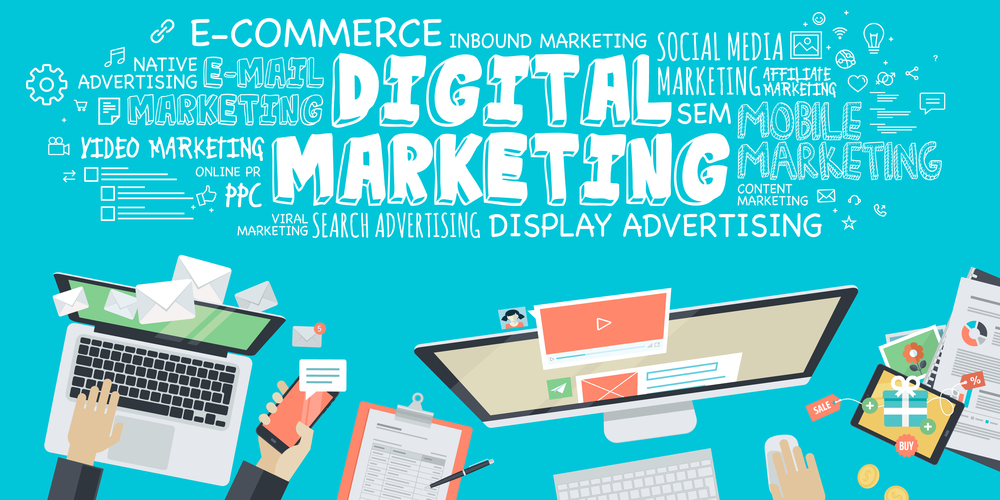3 Fundamentals Of An Effective Digital Marketing Strategy

[This article was first published in May 2021 and has been revised and expanded.]
Digital marketing isn't really an option in today's world. If your business can't be found online, your business may as well not exist.
Think that's an exaggeration or just a bit of journalistic hype? Think again. Estimates indicate that around 91.5 percent of web pages get no organic traffic from Google, indicating a widespread issue with visibility.
Digital Marketing for Everyone - The New Normal
Consider your own consumer behavior. How do you look for a service or a product? The statistics tell us that you most likely use your mobile phone to search.
When you find a likely prospect, what do you do next? Read reviews? Count how many there are and how well they're rated? Do you take time to check out their competition to see how they compare?
And here's what you most likely don't do:
- Look for a business in your local Yellow Pages
- Jot down an address or phone number you saw on a billboard
- Keep a stack of old business cards from service providers you used before
While some people may still do some of these things, most people in most situations go online. For almost everything. Which means if they can't find your business online easily and quickly, you don't exist as far as they are concerned.
Being online in today's digital world - that is, having a business website - is akin to the proverbial tree falling in a forest with no one around: if you have a website online and no one sees it, does it exist?
For all practical (and marketing!) purposes, not really. And keep in mind that direct traffic - those visitors who intentionally look for your specific website - is not the type of online traffic we're talking about here. The goal is to receive a healthy volume of what is called organic traffic.
"Organic traffic" in digital marketing refers to the visitors who come to your website as a result of unpaid or natural search engine results. When users perform a search query on a search engine like Google and click on a non-paid (organic) search result, the traffic generated by those clicks is considered organic traffic.
And why all the fuss about getting organic traffic?
It's because organic search listings tend to receive higher click-through rates (CTRs) than paid results. According to Google, a top-ranking organic result has a CTR of around 40 percent, while most paid search results average a 1.2 to 2.1 percent click-through rate.
So, if a minority of businesses are successful at being easily found online, and more than 80 percent of the customers out there are searching online for what they want or need - which the are - then the vast majority of businesses are losing out on an untold volume of potential customers and clients.
But the good news is that it doesn't have to be complicated nor difficult to implement an effective digital marketing strategy.
Three Fundamentals That Every Business Should Master
When we say "three fundamentals" we certainly don't mean to imply that there are just three things you need to do to consistently end up on the first page of Google search results. In fact, anyone who promises to make that happen for you is someone you want to avoid handing your marketing dollars to.
In fact, there are still shady vendors out there who pitch the promise that they can get your brand to show up at the top of Google's organic listings. The harsh reality is that no one can do that. While it is true that someone is always going to show up in the number one slot of what is known as SERPs, or search engine results pages.
As MailChimp explains it,
Search Engine Results Page (SERP) The page that a search engine returns after a user submits a search query. In addition to organic search results, search engine results pages (SERPs) usually include paid search and pay-per-click (PPC) ads.
But the good news is that there are three main things that any business can put into place to lay the foundation for digital marketing success. And, without them, an effective digital marketing strategy will be difficult if not impossible to implement.
The 3 Building Blocks of Effective Digital Marketing
These three components are fundamental pillars of successful digital marketing strategies:
-
Website: A well-designed and functional website serves as the online hub for a business or brand. It's the primary platform where potential customers visit to learn more about products, services, or the brand itself. A user-friendly, responsive, and visually appealing website is crucial for leaving a positive impression and encouraging visitor engagement.
-
Quality Content: Content is the backbone of digital marketing. It includes everything from blog posts, articles, videos, infographics, social media posts, and more. Providing valuable, relevant, and engaging content not only attracts visitors but also helps in establishing authority, building trust, and encouraging conversions. Compelling content tailored to the target audience's interests and needs can significantly impact a brand's visibility and reputation.
-
Search Engine Optimization (SEO): SEO is essential for improving a website's visibility in search engine results. By optimizing various elements such as keywords, meta descriptions, titles, website structure, and content quality, businesses can enhance their organic traffic. Ranking higher in search engine results pages (SERPs) through effective SEO practices increases the chances of attracting more qualified leads and potential customers.
While these components are crucial, it's important to note that successful digital marketing also involves a broader spectrum of strategies and tools beyond these fundamentals. Elements like social media marketing, email marketing, paid advertising, analytics, and user experience (UX) also play vital roles in a comprehensive digital marketing strategy.
Let's take a deeper look at these fundamental components of your digital marketing efforts.
A Business Website
Before you roll your eyes and say something like, "Seriously? Can't I just use my Facebook page?" keep in mind that perception is reality in the eyes of the beholder.
You don't think so? Consider these recent statistics:
- 85 percent of adults think that a company’s website should be as good or better when viewed on a mobile device than its desktop version.
- 75 percent of consumers say they make judgements about a company’s credibility based on the website design.
- 57 percent of internet users say they won’t recommend a business with a poorly designed mobile website.
- 38 percent of people will click away from a website if the content or layout are unattractive.
- (And 100 percent of Internet users will never find your business if you have no website!)
Here's the thing: it's not enough to simply have a website. That much is essential, of course, but your website must also be exemplary, secure, relatively fast, easy to navigate, and it should make it very clear right at the top what it is you can do for your customers.
Quality Content
For some, the term "content" means words. For others, it doesn't mean much of anything. And that's to be expected since most business owners and managers are not marketers, and content is very much a buzz word among marketers.
However, it is much more than the words on your website.
Content includes everything in your social media posts - assuming you use social media - and in your business emails, newsletters, printed materials, and so on. And that includes images, videos, graphics, and pretty much anything else that is used by your company to communicate with or attract the attention of your customers.
Content is how your customers and prospective customers engage with your brand, your business. It has more than one job to do - it must resonate with your audience. It must inform, educate, or inspire them. And it must engage them.
Google considers content quality to be a factor in ranking pages. Google uses the term E-E-A-T to evaluate the quality of a page. E-E-A-T stands for: Experience, Expertise, Authoritativeness, Trust. Google's ranking systems look for content that demonstrates these qualities.
Some other factors that Google considers when evaluating content quality include:
- Formatting
- Readability
- Grammatical correctness
- Search ranking
- Traffic
- Audience engagement
- User conversion
- Multimedia experience
In addition, Google stresses that high-quality content should be:
- Unique
- Specific
- Original
- Relevant
- Helpful
- Well-structured
- Easy to read
The reason for this is that high-quality content can help attract the right audience to a website. It can also help engage the audience and encourage them to take action on the website.
As one source puts it,
"[T]he content you create is arguably the most important part of your digital marketing efforts. Content not only helps you build trust and connect with your target audience, but also acts as fuel for your other marketing techniques."
Search Engine Optimization (SEO)
This is a term that can cause business owners and others to cringe. Search Engine Optimization - SEO - can be seen as a murky, impossibly complicated, and inherently shady realm that is best avoided or, at the very least, left to some overpaid computer geek.
Would you be surprised to learn that the vast bulk of what constitutes SEO is actually not complicated at all and is, in fact, needlessly overlooked or poorly executed?
At it's most fundamental, the role of SEO to increase exposure of your company to potential customers on search engines (namely, Google!). Your company’s SEO efforts should be regularly analyzed and different tactics can be implemented periodically to help improve how well your company's search results rank for certain topics or search terms.
As Google for Developers puts it,
You should build a website to benefit your users, and gear any optimization toward making the user experience better. One of those users is a search engine, which helps other users discover your content. SEO is about helping search engines understand and present content.
And, according to a post at Digital Marketing Institute,
SEO can help you build better relationships with your audience, improve the customer experience, increase your authority, drive more people to your site, give you an edge over the competition, and increase conversions, which means more sales, more loyal customers, and more growth for your business.

Make Us Your Partners for Digital Marketing
When it comes to implementing your digital marketing strategy high-quality, relevant content is one of the main keys to attracting and winning prospects and customers.
That content can take on many forms such as video, blog posts, eBooks, white papers, email, slide decks, infographics, webinars, and even the pages on your website.
However, the challenge for most business owners is in creating this never-ending need for fresh content. Then there is the additional challenge of determining how best to distribute and use that content to carry out an effective marketing strategy.
Fortunately, you don't have to attempt this on your own! Your options for implementing a successful and affordable content marketing strategy also include finding a professional firm that can work with you to maximize your efforts.
A qualified agency like BroadVision Marketing will develop a road map with an implementation time line, marketing milestones, and key deliverables. Using this road map we will create the framework and structure for us to work with you and help you to achieve your marketing goals.
Get your Free Complimentary Inbound Marketing Session to help you make an informed decision or call BroadVision Marketing at 707-799-1238.
You May Also Like
These Related Stories

3 Main Fundamentals Of An Effective Digital Marketing Strategy

SEO Basics For 2021 You Should Know







No Comments Yet
Let us know what you think